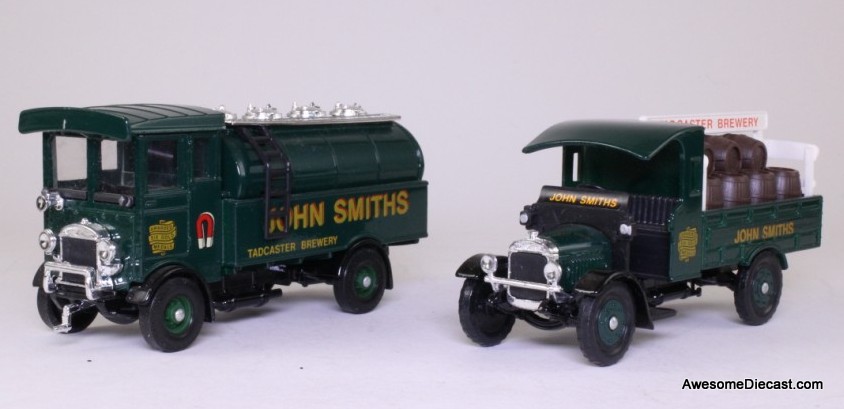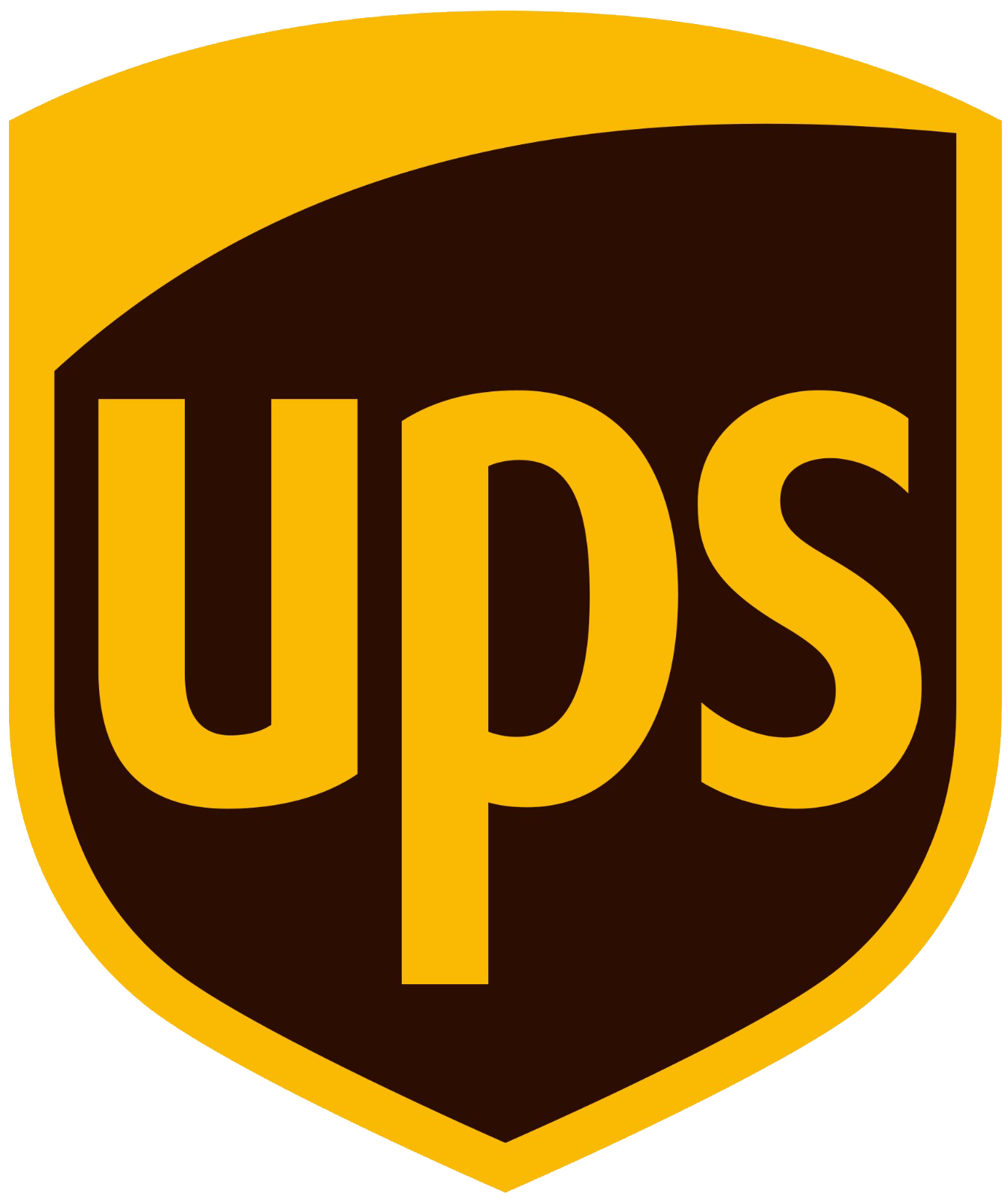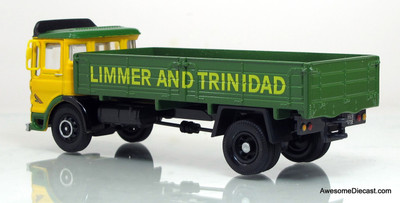Corgi
Corgi 1:50 AEC Tanker & Thornycroft Beer Truck 'John Smith'

Corgi 1:50 AEC Tanker & Thornycroft Beer Truck 'John Smith'
$49.95
Associated Equipment Company (AEC) was an English vehicle manufacturer that built buses, motorcoaches and trucks from 1912 until 1979. The name Associated Equipment Company was hardly ever used; instead it traded under the AEC and ACLO brands.
AEC's first commercial vehicle was a lorry based on the X-type bus chassis. With the outbreak of World War I in 1914, AEC's ability to produce large numbers of vehicles using assembly line methods became important in supplying the increasing need for army lorries. AEC began large-scale production of the 3-ton Y-type lorry, commenced in 1916, and continued beyond the end of the war. From then on, AEC became associated with both lorries and buses.
In 1926, AEC and Daimler formed the Associated Daimler Company, which was dissolved two years later. In 1927, AEC moved its manufacturing from Walthamstow to a new plant at Southall.
G. J. Rackham was appointed Chief Engineer and Designer in 1928. He had previously worked for Leyland Motors. His ideas contributed significantly to AEC's reputation for quality and reliability.
From 1929, AEC produced new models: the names of lorries began with "M" (Majestic, Mammoth, Mercury, and so on), and those of buses began with "R" (Regent, Regal, Renown, and so on). These original "M-models" continued in production until the end of World War II. AEC introduced diesel engines across the range in the mid-1930s.
From 1931 to 1938, AEC and English Electric co-produced trolleybuses. AEC supplied the chassis, and English Electric the electric motors and control equipment.
In 1932, AEC took a controlling interest in the British subsidiary of the American Four Wheel Drive (FWD) company, and began to use more standard AEC components in those vehicles. To avoid confusion, these were marketed under the name Hardy. Production ceased about 1936.
Thornycroft was a United Kingdom-based vehicle manufacturer which built coaches, buses, and trucks from 1896 until 1977.
John Isaac Thornycroft, the naval engineer, also formed the Thornycroft Steam Carriage and Van Company which built its first steam van in 1896. This was exhibited at the Crystal Palace Show, and could carry a load of 1 ton. It was fitted with a Thornycroft marine launch-type boiler (Thornycroft announced a new boiler designed for their steam carriages in October 1897. The engine was a twin-cylinder compound engine arranged so that high-pressure steam could be admitted to the low-pressure cylinder to give extra power for hill-climbing. A modified version of the steam wagon with a 6-cubic-yard tipper body was developed for Chiswick council in 1896 and went into service as a very early self-propelled dust-cart. While the original 1896 wagon had front-wheel drive with rear-wheel steering, the tipper dust-cart had rear-wheel drive and front-wheel steering. The Thornycroft tipper was built by the Bristol Wagon and Carriage Company, though engined by Thornycroft.
Thornycroft's first petrol vehicle was built in 1902, and the company completed the move into internal combustion engine power in 1907.
Thornycroft's Basingstoke factory supplied nearly 5,000 motor vehicles for war purposes. They also provided "quite a large number of engines of various powers" to the Admiralty, the War Office and to other Government Departments at the beginning of the war and for the next two years. Thereafter they manufactured marine motors for the coastal motor-boats built at the Woolston, Southampton works. They also made the Thornycroft depth-charge thrower for anti-submarine warfare.
From 1931, Thornycroft used names for their vehicle range – descriptive and colourful ones. During World War II the company designed the Terrapin and other war-related vehicles.
In 1948, the company name was changed to Transport Equipment (Thornycroft) Ltd to prevent confusion with the shipbuilding Thornycroft company. The company was well known for providing fire-engine chassis, with multi-axle drive for uses such as airports. A limited number of 4x4 chassis were also provided to Worcester-based fire engine manufacturer, Carmichael for sale to civilian brigades in the 1950s.
They were taken over in 1961 by AEC parent Associated Commercial Vehicles Ltd, and production was limited to Nubians, Big Bens and Antars, although the Thornycroft-designed six-speed constant mesh gearbox was used in AEC and later medium weight Leyland and Albion trucks. ACV was then taken over by Leyland in 1962. They already had a specialist vehicle unit in Scammell, another manufacturer of large haulage vehicles. Thornycroft's Basingstoke factory was closed in 1969 and specialist vehicles transferred to Scammell at Watford.
ohn Smith's Brewery in Tadcaster, North Yorkshire, England, produces beers including John Smith's, the highest selling bitter in the United Kingdom since the mid-1990s.
The majority of John Smith's sales are of the nitrogenated Extra Smooth product, although a cask conditioned variant is available nationally. A stronger variant called Magnet is also available in the North East of England. John Smith's Cask and Magnet are produced under licence by Cameron's in Hartlepool.
John Smith acquired the Backhouse & Hartley brewery in 1852. Following a series of acquisitions in the post-World War II period, the company became one of the largest regional brewers in the country, operating over 1,800 licensed premises. The company was taken over by Courage in 1970 who extended distribution of the brewery's products into the South of England. Courage was acquired by Scottish & Newcastle in 1995, and the operations were purchased by Heineken in 2008.
John Smith's Extra Smooth and Original are produced at the Tadcaster brewery, as well as a range of Heineken products including Kronenbourg 1664 and Amstel. With a 38 million litre capacity, the brewery is one of the largest in the country.
John Smith's became well known for a series of highly successful "No Nonsense"-themed television advertising campaigns, featuring the dour Yorkshireman character "Arkwright" during the 1970s and 1980s (shown only in the South of England), followed by the comedians Jack Dee during the 1990s and Peter Kay since 2002. The brand also has an association with horse racing: it was the principal sponsor of the Grand National between 2005 and 2013, the Northumberland Plate from 2003 until 2016, and has sponsored the John Smith's Cup since 1960
In October 1970, Courage purchased John Smith's in a friendly takeover which valued the company at £40 million (£607,740,379 in 2019 adjusted for inflation). By this time John Smith's owned around 1,800 licensed premises throughout the north of England, and as far south as Lincolnshire, Nottinghamshire and parts of Cambridgeshire and Shropshire. The merged company held assets worth £137 million. By combining Courage's strength in the South of England, and John Smith's in the North, a national brewing company was created. John Smith's bottled Magnet Pale Ale was selected for nationwide distribution across the group, and the takeover facilitated the wider distribution of Courage brands such as Tavern Keg.
The Tadcaster brewery was substantially redeveloped and expanded throughout 1974. Courage closed down the Barnsley brewery in 1976 with the loss of 200 jobs, and the 200 Barnsley public houses were supplied from Tadcaster. Courage argued that modernisation of the Barnsley site would have required "massive" investment. It was reported in The Times that landlords were generally indifferent to the change, as the taste profiles of John Smith's bitter and Barnsley bitter were similar.
After successful test marketing from 1974, John Smith's Bitter was distributed in the South of England from 1979 onwards, accompanied by an extensive marketing budget. As research by Courage indicated that Southern drinkers considered Yorkshire bitter to be superior, the beer was sold there under the name John Smith's Yorkshire Bitter. Sales of the beer doubled in 1981 owing to the increase in free trade outlets in the South stocking the beer. By 1982 it was the highest selling Courage brand and the highest selling canned bitter in the United Kingdom.
In 1982, the John Smith's brands included Yorkshire Bitter, Magnet Pale Ale, Export Pale, Sweet Stout, Double Brown and Magnet Old. In December 1983, John Smith's Cask (3.8% ABV) was re-introduced, seven years after it had been phased out. By June 1985, John Smith's produced 1.7 million hectolitres of beer annually. In November that year, a new brewhouse was opened, at the cost of £5 million. Production of Foster's lager began in 1987.
In 1993, John Smith's Extra Smooth was launched in cans. It was introduced in kegs in February 1995, and distributed to 10,000 pubs and venues. It is a nitrogenated version of the pasteurised beer, which was renamed to John Smith's Original in order to differentiate the two products.
In 2005, Scottish & Newcastle claimed that John Smith's was available in 40,000 outlets across the United Kingdom. In 2007, Scottish & Newcastle moved production of John Smith's Cask from Tadcaster to Burtonwood near Warrington, and production of John Smith's Magnet to Camerons Brewery of Hartlepool. In 2008 three limited edition beers were released to celebrate the 250th anniversary of the brewery. In 2010 Heineken discontinued production of cask conditioned John Smith's Magnet, although it remains available in kegs. By 2011, production of John Smith's Cask had moved to Cameron's. As of 2012, John Smith's is the sixth highest selling beer brand in the United Kingdom and the highest selling bitter in the world. From February 2013, John Smith's Extra Smooth and Original were reduced from 3.8 to 3.6% ABV.[57] According to Heineken, the decision was taken in order to bring the product in line with the strength of its major competitors such as Tetley, Boddingtons and Worthington.











